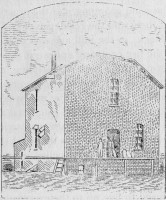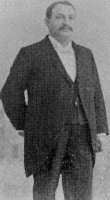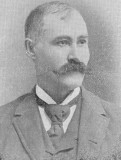
Manning Roller Mill
THE MEMORABLE GRINNELL CYCLONE of June 18, 1882, is still vividly remembered by many of Manning's early settlers. The main storm cloud passed north east of Manning and met the opposing current, which passed south, at Sheldahl, where it assumed the shape of a cyclone and proceeded on its course of destruction. Iowa College, at Grinnell, suffered to the extent of $50,000, while 41 persons were killed outright and 150 were wounded, 80 of which were serious; 23 dead were reported at other places. Those who witnessed the storm say that Manning's location at this time was "to near the scene of action to be comfortable".

A HEAVY SNOW STORM set in from the east, January 25, 1883, says the Manning Monitor which increased towards night and continued with a heavy fall of snow and strong piercing winds until January 30. The railroads were all blocked, and the trains on the Milwaukee that were not abandoned, stuck fast in the drifts. The train due here Friday morning, going west, suppered at Coon Rapids and reached the big cut west of Templeton, at 10 P. M., where it remained until 10 A. M., Saturday, when it came fhrough, piloted by a mammoth snow plow and four engines in addition to its own, reaching here at noon. It carried about fifty passengers and about that many hands who shoveled snow, all of whom took dinner at Manning.
It was a feast day for restaurants. This train had gone about ten miles west by nightfall. Later in the night it met the east-bound train at Defiance, and the road was then comparatively clear into Council Bluffs. The wind continued to blow all of Saturday night and all day Sunday, so that it became necessary for the snowplow to run back over the track before a light train could pass over the road on Monday. On the Southwestern, the work of clearing the right of way was slower. The train ran into Carroll on Friday evening and did not return until Monday evening; and then only to Manning, as both the Audubon and Kirkman branches were snowed under.
As a result of this storm and a few that followed shortly after, a large of men were shoveling snow, west of Manning on the Milwaukee, when a few men stepped back from their work and slapped their hands about them to increase the circulation of the blood. The engineer of the snowplow seeing the motion, mistook it for a signal to come ahead. He drove his engine forward and would have crushed a number of men, whom he could not see for the flying snow, but fortunately his engine was choked down by a heavy drift before the wretched work was accomplished. The men were standing in the narrow cut where there was no possible means of escape had the engine not stopped when it did.
The stories of the railroaders and shovelers of the west for the month of these heavy storms was full of wonderful adventure, narrow escapes, and examples of great bravery. As an illustration, while an engine, standing in the blinding storm, was taking water at the tank at Aspinwall, a snow plow driven by two huge engines went rushing through to the west, and failing to see the engine at the tank because of the blinding snow went crashing into it.
A passenger train with more than a hundred passengers, lay at Manning from Saturday till
Sunday noon waiting for the road to be opened.
The mayor kindly made himself known to them and offered to secure comfortable quarters
for any who desired them. Several passengers availed themselves of the opportunity and
was handsomely cared for in the town.


U.S. Heffelfinger
A SEVERE HAIL AND WINDSTORM struck Manning about 6 P. M., Friday lay evening, April 11, 1883, when a dark cloud came up from the south, overspreading the entire heavens. The wind blew a gale and a great quantity of hail and rain fell before dark. The wind continued to blow and increase its fury until midnight, when it swept over the town ''like a hurricane. This continued for nearly half an hour, during which time considerable damage was done to some of the buildings in the town. The tin roof was swept off from one building, and one store building which stood on a pin foundation, swayed back and forth like a drunken man, while small out buildings were completely demolished.
A TERRIFIC HAIL STORM visited Manning about half past-six, Thursday evening, August
7, 1883. A dark and threatening cloud overshadowed the town from the north and seemed
to bear slightly to the east. It came directly in the face of an undercurrent of wind blowing
warm from the south. Scarcely had the cloud overspread the town when rain and hail
began to fall and suddenly increased, until the storm fairly raged; and the hail came in a
perfect torrent. The wind changed in a few minutes and drove the hail through nearly all
windows facing to the east. There was scarcely a house in town that was not flooded with
water and hail. Hail, as large as hens eggs and a few as large as goose eggs, are said to
have crashed through the window panes.
All of the business houses, situated on the west
side of Main Street not covered with awnings, had their glass fronts broken, while the
number of panes of glass broken in town is estimated at not less than 1000. The loss in
the town was very slight when compared with that which was sustained by the farmers
who lived between Manning and Arcadia on the north and Manning and Audubon on the
south. The corn was cut down clean; not a stock of it was left with sufficient life to revive;
it was worth no more than the stubs would be after the corn had been cut for fodder in the
fall; whole farms were like a barren waste.
The grass on the prairie was beaten off to the ground, even the rank grass in the sloughs. Fields of wheat and oats, that had not been cut, had the appearance of stubble well pastured down. The prairie grass looked as though a herd of cattle had trampled it into the ground. The train which was due from Audubon at 7:15 p. m. had just left Gray when the storm struck it, and was stopped in a cut where the train men said that they were "well nigh hailed in". Nearly every light of glass on one side of the train was broken, and the hail piled up about the train and upon the platform of the cars three to five feet deep. What was seen one day after the storm, convinced the spectator that the rain fell in torrents; as the hail was carried down the valley and ravines and washed into the buyous, where it then lay 18 hours after the storm in a hot sun, in heaps covering acres and acres of ground, from one to five feet deep. In two instances, two fence posts were covered out of sight by clean hail. Not much stock was killed but there was not much left on the farm to feed those that survived. The crops damaged, will amount to over 12000 acres, of which, most is a total loss, while the owners are reduced to extreme want. A meeting for the relief of the unfortunate sufferers was called and every advisable step was taken that could lead to procuring aid for them and sufficient funds to carry them over till a new crop could be harvested.
THE HEAVIEST RAINSTORM that had considering the time of its duration ever visited Manning, is chronicled, in part, in the Manning Monitor bearing date of May 21, 1897. Not since the spring of 81 have the people living along the Nishnabotna valley witnessed such a rush; of water as swept down over the valley on Wednesday evening of this week. All afternoon a threatening and angry looking storm could be seen gathering in the northwest; and by four o'clock it had started in a southwesterley course and was soon upon us. When approaching, there was a great commotion among the advance clouds, and the storm was watched with considerable anxiety by the inhabitants; fearing a heavy wind.
They were happily disappointed, however, but it rained, and it was never known to
rain harder, for about three quarters of an hour. Shortly following the passing over of the
storm a great valley of water came rushing down over the valley as if it had broken loose,
all at once, from some great dam or reservoir. Standing on the Milwaukee trestle at
eventide, one could easily be led to imagine that they were overlooking the raging
Mississippi. From the time the storm ceased till long after sunset, all of the railroads
leading into town, were lined with people watching the progress of the water.
Both
North-Western trains, due here from the south at 6:20, were an hour late, being compelled
to run slow on account of the soggy condition of the track. The Carroll train did not get out
north until about 10 a. m. the next forenoon, owing to a washout a couple of miles north.
A gang of men were seen out from here to shape up the track, taking them all night and
part of yesterday forenoon to complete the job. The whole bottom east of the city was also
covered with water to a considerable depth, several dwelling houses there being partly
emerged.
The occupants succeeded in get getting out their household effects before worst
came. Many wagon bridges were either removed from their foundations or entirely
washed away. When the flood had reached its highest mark, a farmer, accompanied by
his wife and child, drove across the bottom on the road west of town. The water was so
deep and the current so swift at one juncture in the road that they were almost capsized;
but, luckily, they pulled into town all right. They had not even anticipated the danger
enough to get scared. A young son of Claus Opperman, residing northwest of town, fell
into the water, at a point near his home, and was only rescued in the nick of time to save
his life. From all around, considerable damage was reported to crops on the lowlands
besides much corn being washed out on the hills.
A SECOND HAILSTORM visited Manning on August 5, this same year, reaching its greatest fury about 5:30 o'clock in the afternoon The rain came down in such torrents that it was almost impossible to see across the street. Those occupying office rooms in the top floors of buildings were terrified by the force of the rain and hail pounding on the tin roofs over their heads. It was so deafening that it was almost impossible to make yourself heard at all. During the storm a large plate glass three eighths of an inch thick, in the front of the Lawrence building, went to pieces. Some houses had every glass in them, that was exposed to the storm, broken. The wind played havoc with the trees, out buildings, unharvested small grain and corn, although, most of the grain was either in the shock or stack; the corn was whipped nearly to the ground while the hail stripped it completely of its plumage. Some trees were uprooted by the wind and others were stripped of their foliage and branches by the hail and wind. Gardens and green fruit were ruined, while all unsheltered stock was greatly injured. The storm lasted about half an hour and cut a swath about half a mile wide.